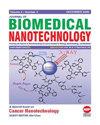白藜芦醇纳米颗粒通过Sirtuin 1途径阻止eNOS解偶联抑制腹主动脉瘤内皮功能障碍
IF 2.9
4区 医学
Q1 Medicine
引用次数: 0
摘要
腹主动脉瘤(AAA)是一种慢性主动脉扩张的病理状态。本研究探讨了白藜芦醇纳米颗粒对AAA内皮功能障碍抑制作用的机制。对照组(n = 18)灌胃生理盐水,模型组(n = 18)植入Alzet微泵诱导AAA,造模后收集腹主动脉组织内皮细胞,分别给予白藜芦醇纳米颗粒和白藜芦醇纳米颗粒+SIRT1(白藜芦醇纳米颗粒+SIRT1组)处理。CCK-8法检测腹主动脉内皮细胞增殖能力,流式细胞术检测细胞凋亡,transwell法检测迁移能力,并分析SIRT1水平、eNOS和NO含量。白藜芦醇纳米颗粒组(0.41±0.04,0.60±0.05,0.69±0.04)和白藜芦醇+SIRT1组(0.37±0.05,0.49±0.04,0.57±0.04)内皮细胞增殖能力显著降低,白藜芦醇+SIRT1组细胞增殖能力较低(P <0.05)。治疗后内皮细胞凋亡增强,迁移能力下降(P <0.05),且联合治疗效果更显著。此外,白藜芦醇纳米颗粒(0.44±0.02,0.34±0.05)或白藜芦醇纳米颗粒加SIRT1(0.50±0.01,0.44±0.03)可提高SIRT1水平(P <0.05)、eNOS活性和NO分泌(P <0.05)。白藜芦醇纳米颗粒通过增加SIRT1的表达,降低内皮细胞的增殖和迁移,诱导细胞凋亡。本文章由计算机程序翻译,如有差异,请以英文原文为准。
Resveratrol Nanoparticles Inhibit Endothelial Dysfunction in Abdominal Aortic Aneurysm by Preventing eNOS Uncoupling Through Sirtuin 1 Pathway
Abdominal aortic aneurysm (AAA) is a pathological condition of chronic dilation of the aorta. This study investigated the mechanism underlying the inhibitory effect of resveratrol nanoparticles on AAA endothelial dysfunction. Mice in the control group received normal saline ( n = 18) while those in the model group ( n = 18) were implanted with Alzet micropumps to induce AAA. After modeling, the endothelial cells of abdominal aortic tissue were collected and treated with resveratrol nanoparticles and resveratrol nanoparticles plus sirtuin 1 (SIRT1) (resveratrol nanoparticles+SIRT1 group). CCK-8 method detected proliferation ability of abdominal aortic endothelial cells, flow cytometry assessed cell apoptosis, and transwell method measured the migration ability along with analysis of SIRT1 level, eNOS and NO content. The proliferation ability of endothelial cells was significantly decreased in resveratrol nanoparticles group (0.41±0.04, 0.60±0.05, 0.69±0.04) and resveratrol+SIRT1 group (0.37±0.05, 0.49±0.04, 0.57±0.04), with lower proliferation in resveratrol+SIRT1 group ( P <0.05). Treatment resulted in enhancement of endothelial cell apoptosis and decreased migration ability ( P <0.05), as the effect of combined treatment was more significant. Moreover, resveratrol nanoparticles (0.44±0.02, 0.34±0.05) or resveratrol nanoparticles plus SIRT1 (0.50±0.01, 0.44±0.03) increased SIRT1 level ( P <0.05), eNOS activity and NO secretion ( P <0.05) in the resveratrol+SIRT1 group. Resveratrol nanoparticles can reduce endothelial cell proliferation and migration and induce apoptosis when increasing SIRT1 expression.
求助全文
通过发布文献求助,成功后即可免费获取论文全文。
去求助
来源期刊
CiteScore
4.30
自引率
17.20%
发文量
145
审稿时长
2.3 months
期刊介绍:
Information not localized

 求助内容:
求助内容: 应助结果提醒方式:
应助结果提醒方式:


